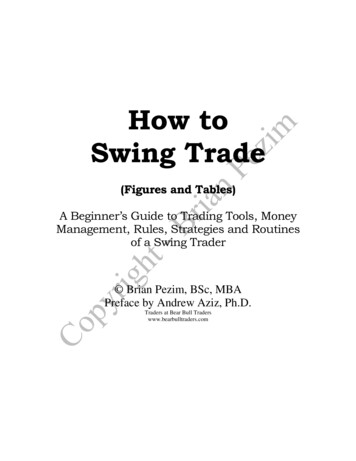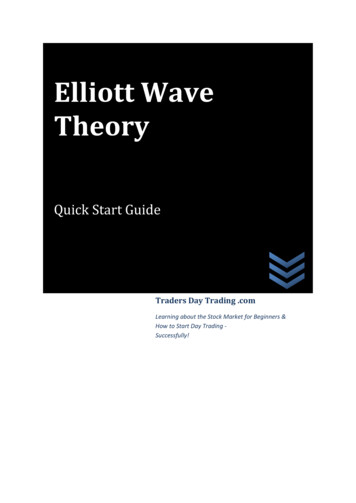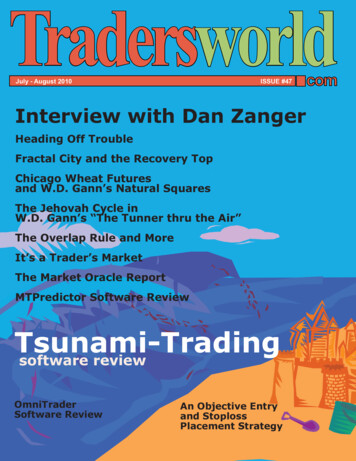
Transcription
The Time TradersNorton, Andre AlicePublished: 1958Categorie(s): Fiction, Science FictionSource: http://www.gutenberg.org1
About Norton:Andre Alice Norton (February 17, 1912 – March 17, 2005),science fiction and fantasy author (with some works of historical fiction and contemporary fiction), was born Alice Mary Norton in Cleveland, Ohio, in the United States. She published herfirst novel in 1934. She was the first woman to receive theGandalf Grand Master Award from the World Science FictionSociety in 1977, and she won the Damon Knight MemorialGrand Master Award from the SFWA in 1983. She wrote underthe noms de plume Andre Norton, Andrew North and Allen Weston. Source: WikipediaAlso available on Feedbooks for Norton:Galactic Derelict (1959)Key out of Time (1963)Star Born (1957)Plague Ship (1956)Star Hunter (1961)The Defiant Agents (1962)Storm Over Warlock (1960)Rebel Spurs (1962)Voodoo Planet (1959)All Cats Are Gray (1953)Copyright: Please read the legal notice included in this e-bookand/or check the copyright status in your country.Note: This book is brought to you by Feedbookshttp://www.feedbooks.comStrictly for personal use, do not use this file for commercialpurposes.2
Chapter1To anyone who glanced casually inside the detention room theyoung man sitting there did not seem very formidable. Inheight he might have been a little above average, but notenough to make him noticeable. His brown hair was croppedconservatively; his unlined boy's face was not one to be remembered—unless one was observant enough to note thoselight-gray eyes and catch a chilling, measuring expressionshowing now and then for an instant in their depths.Neatly and inconspicuously dressed, in this last quarter ofthe twentieth century his like was to be found on any street ofthe city ten floors below—to all outward appearances. But thatother person under the protective coloring so assiduously cultivated could touch heights of encased and controlled furywhich Murdock himself did not understand and was only justlearning to use as a weapon against a world he had alwaysfound hostile.He was aware, though he gave no sign of it, that a guard waswatching him. The cop on duty was an old hand—he probablyexpected some reaction other than passive acceptance fromthe prisoner. But he was not going to get it. The law had Rosssewed up tight this time. Why didn't they get about the business of shipping him off? Why had he had that afternoon session with the skull thumper? Ross had been on the defensivethen, and he had not liked it. He had given to the other's questions all the attention his shrewd mind could muster, but afaint, very faint, apprehension still clung to the memory of thatmeeting.The door of the detention room opened. Ross did not turn hishead, but the guard cleared his throat as if their hour of mutual silence had dried his vocal cords. "On your feet, Murdock!The judge wants to see you."3
Ross rose smoothly, with every muscle under fluid control. Itnever paid to talk back, to allow any sign of defiance to show.He would go through the motions as if he were a bad little boywho had realized his errors. It was a meek-and-mild act thathad paid off more than once in Ross's checkered past. So hefaced the man seated behind the desk in the other room withan uncertain, diffident smile, standing with boyish awkwardness, respectfully waiting for the other to speak first.Judge Ord Rawle. It was his rotten luck to pull old EagleBeak on his case. Well, he would simply have to take it whenthe old boy dished it out. Not that he had to remain stuck withit later ."You have a bad record, young man."Ross allowed his smile to fade; his shoulders slumped. Butunder concealing lids his eyes showed an instant of colddefiance."Yes, sir," he agreed in a voice carefully cultivated to shakeconvincingly about the edges. Then suddenly all Ross's pleasure in the skill of his act was wiped away. Judge Rawle was notalone; that blasted skull thumper was sitting there, watchingthe prisoner with the same keenness he had shown the otherday."A very bad record for the few years you have had to makeit." Eagle Beak was staring at him, too, but without the samelook of penetration, luckily for Ross. "By rights, you should beturned over to the new Rehabilitation Service ."Ross froze inside. That was the "treatment," icy rumors ofwhich had spread throughout his particular world. For thesecond time since he had entered the room his self-confidencewas jarred. Then he clung with a degree of hope to the phrasing of that last sentence."Instead, I have been authorized to offer you a choice, Murdock. One which I shall state—and on record—I do not in theleast approve."Ross's twinge of fear faded. If the judge didn't like it, theremust be something in it to the advantage of Ross Murdock.He'd grab it for sure!"There is a government project in need of volunteers. Itseems that you have tested out as possible material for this assignment. If you sign for it, the law will consider the time spent4
on it as part of your sentence. Thus you may aid the countrywhich you have heretofore disgraced——""And if I refuse, I go to this rehabilitation. Is that right, sir?""I certainly consider you a fit candidate for rehabilitation.Your record—" He shuffled through the papers on his desk."I choose to volunteer for the project, sir."The judge snorted and pushed all the papers into a folder. Hespoke to a man waiting in the shadows. "Here then is your volunteer, Major."Ross bottled in his relief. He was over the first hump. Andsince his luck had held so far, he might be about to win all theway .The man Judge Rawle called "Major" moved into the light. Atthe first glance Ross, to his hidden annoyance, found himselfuneasy. To face up to Eagle Beak was all part of the game. Butsomehow he sensed one did not play such games with thisman."Thank you, your honor. We will be on our way at once. Thisweather is not very promising."Before he realized what was happening, Ross found himselfwalking meekly to the door. He considered trying to give themajor the slip when they left the building, losing himself in astorm-darkened city. But they did not take the elevator downstairs. Instead, they climbed two or three flights up the emergency stairs. And to his humiliation Ross found himself pantingand slowing, while the other man, who must have been a gooddozen years his senior, showed no signs of discomfort.They came out into the snow on the roof, and the majorflashed a torch skyward, guiding in a dark shadow whichtouched down before them. A helicopter! For the first timeRoss began to doubt the wisdom of his choice."On your way, Murdock!" The voice was impersonal enough,but that very impersonality got under one's skin.Bundled into the machine between the silent major and anequally quiet pilot in uniform, Ross was lifted over the city,whose ways he knew as well as he knew the lines on his ownpalm, into the unknown he was already beginning to regard dubiously. The lighted streets and buildings, their outlinessoftened by the soft wet snow, fell out of sight. Now they couldmark the outer highways. Ross refused to ask any questions.5
He could take this silent treatment; he had taken a lot oftougher things in the past.The patches of light disappeared, and the country openedout. The plane banked. Ross, with all the familiar landmarks ofhis world gone, could not have said if they were headed northor south. But moments later not even the thick curtain of snowflakes could blot out the pattern of red lights on the ground,and the helicopter settled down."Come on!"For the second time Ross obeyed. He stood shivering, engulfed in a miniature blizzard. His clothing, protection enoughin the city, did little good against the push of the wind. A handgripped his upper arm, and he was drawn forward to a lowbuilding. A door banged and Ross and his companion came intoa region of light and very welcome heat."Sit down—over there!"Too bewildered to resent orders, Ross sat. There were othermen in the room. One, wearing a queer suit of padded clothing,a bulbous headgear hooked over his arm, was reading a paper.The major crossed to speak to him and after they conferred fora moment, the major beckoned Ross with a crooked finger.Ross trailed the officer into an inner room lined with lockers.From one of the lockers the major pulled a suit like thepilot's, and began to measure it against Ross. "All right," hesnapped. "Climb into this! We haven't all night."Ross climbed into the suit. As soon as he fastened the lastzipper his companion jammed one of the domed helmets on hishead. The pilot looked in the door. "We'd better scramble, Kelgarries, or we may be grounded for the duration!"They hurried back to the flying field. If the helicopter hadbeen a surprising mode of travel, this new machine wassomething straight out of the future—a needle-slim ship poisedon fins, its sharp nose lifting vertically into the heavens. Therewas a scaffolding along one side, which the pilot scaled toenter the ship.Unwillingly, Ross climbed the same ladder and found that hemust wedge himself in on his back, his knees hunched up almost under his chin. To make it worse, cramped as those quarters were, he had to share them with the major. A transparenthood snapped down and was secured, sealing them in.6
During his short lifetime Ross had often been afraid, bitterlyafraid. He had fought to toughen his mind and body againstsuch fears. But what he experienced now was no ordinary fear;it was panic so strong that it made him feel sick. To be shut inthis small place with the knowledge that he had no control overhis immediate future brought him face to face with every terrorhe had ever known, all of them combined into one horriblewhole.How long does a nightmare last? A moment? An hour? Rosscould not time his. But at last the weight of a giant handclamped down on his chest, and he fought for breath until theworld exploded about him.He came back to consciousness slowly. For a second hethought he was blind. Then he began to sort out one shade ofgrayish light from another. Finally, Ross became aware that heno longer rested on his back, but was slumped in a seat. Theworld about him was wrung with a vibration that beat in turnthrough his body.Ross Murdock had remained at liberty as long as he had because he was able to analyze a situation quickly. Seldom in thepast five years had he been at a loss to deal with any challenging person or action. Now he was aware that he was on thedefensive and was being kept there. He stared into the darkand thought hard and furiously. He was convinced thateverything that was happening to him this day was designedwith only one end in view—to shake his self-confidence andmake him pliable. Why?Ross had an enduring belief in his own abilities and he alsopossessed a kind of shrewd understanding seldom granted toone so young. He knew that while Murdock was important toMurdock, he was none too important in the scheme of things asa whole. He had a record—a record so bad that Rawle mighteasily have thrown the book at him. But it differed in one important way from that of many of his fellows; until now he hadbeen able to beat most of the raps. Ross believed this waslargely because he had always worked alone and taken pains toplan a job in advance.Why now had Ross Murdock become so important tosomeone that they would do all this to shake him? He was a volunteer—for what? To be a guinea pig for some bug they7
wanted to learn how to kill cheaply and easily? They'd been ina big hurry to push him off base. Using the silent treatment,this rushing around in planes, they were really working to keephim groggy. So, all right, he'd give them a groggy boy all setup for their job, whatever it was. Only, was his act goodenough to fool the major? Ross had a hunch that it might notbe, and that really hurt.It was deep night now. Either they had flown out of the pathof the storm or were above it. There were stars shiningthrough the cover of the cockpit, but no moon.Ross's formal education was sketchy, but in his own fashionhe had acquired a range of knowledge which would have surprised many of the authorities who had had to deal with him.All the wealth of a big city library had been his to explore, andhe had spent much time there, soaking up facts in many oddbranches of learning. Facts were very useful things. On at leastthree occasions assorted scraps of knowledge had preservedRoss's freedom, once, perhaps his life.Now he tried to fit together the scattered facts he knewabout his present situation into some proper pattern. He wasinside some new type of super-super atomjet, a machine so advanced in design that it would not have been used for anythingthat was not an important mission. Which meant that RossMurdock had become necessary to someone, somewhere.Knowing that fact should give him a slight edge in the future,and he might well need such an edge. He'd just have to wait,play dumb, and use his eyes and ears.At the rate they were shooting along they ought to be out ofthe country in a couple of hours. Didn't the Government havebases half over the world to keep the "cold peace"? Well, therewas nothing for it. To be planted abroad someplace might interfere with plans for escape, but he'd handle that detail whenhe was forced to face it.Then suddenly Ross was on his back once more, the gianthand digging into his chest and middle. This time there wereno lights on the ground to guide them in. Ross had no intimation that they had reached their destination until they set downwith a jar which snapped his teeth together.The major wriggled out, and Ross was able to stretch hiscramped body. But the other's hand was already on his8
shoulder, urging him along. Ross crawled free and clung dizzilyto a ladderlike disembarking structure.Below there were no lights, only an expanse of open snow.Men were moving across that blank area, gathering at the footof the ladder. Ross was hungry and very tir
Andre Alice Norton (February 17, 1912 – March 17, 2005), science fiction and fantasy author (with some works of historic-al fiction and contemporary fiction), was










